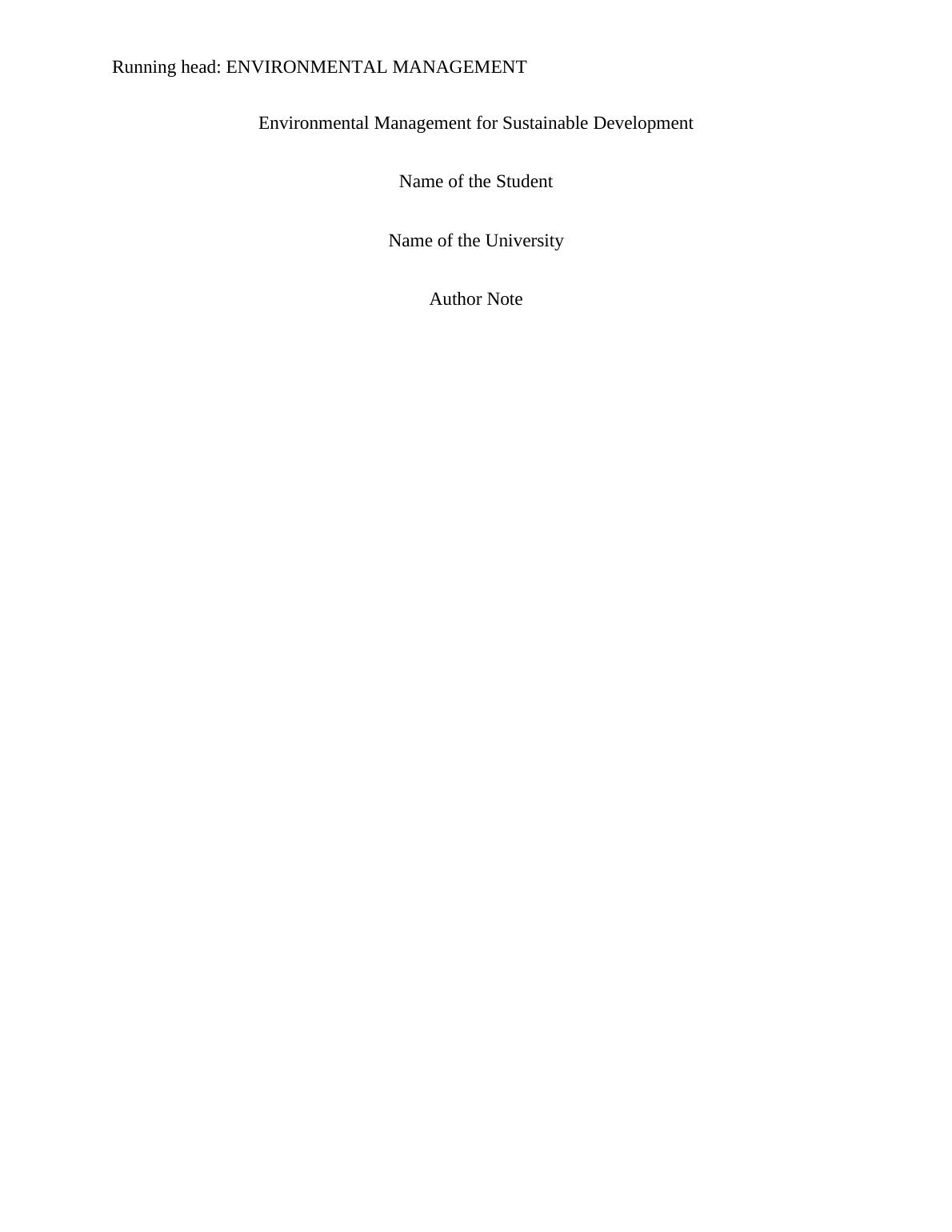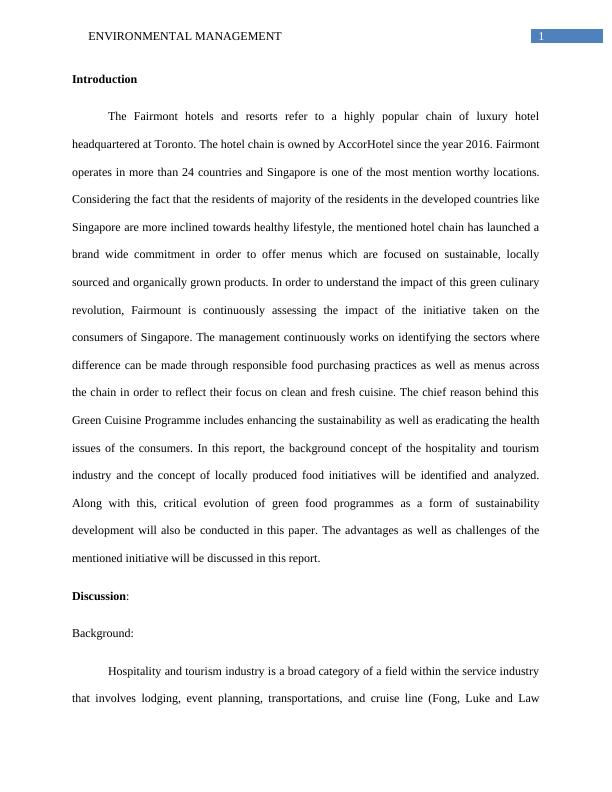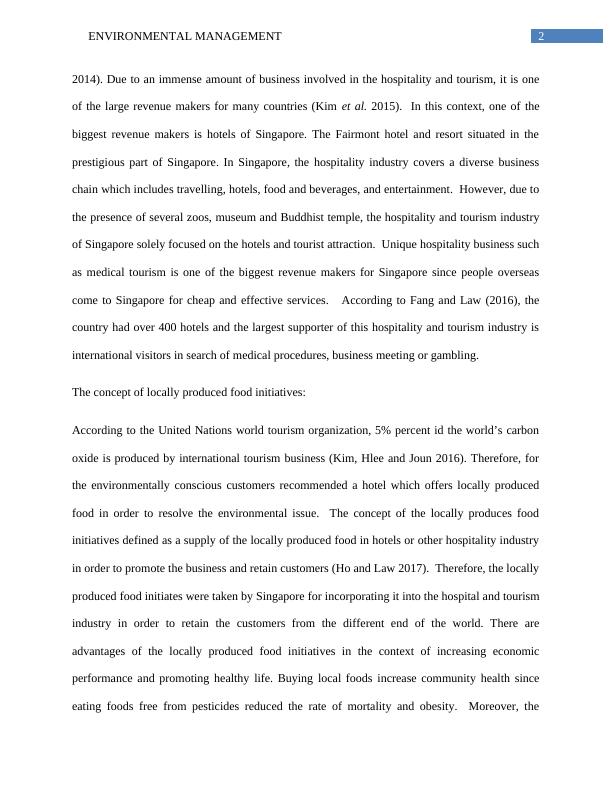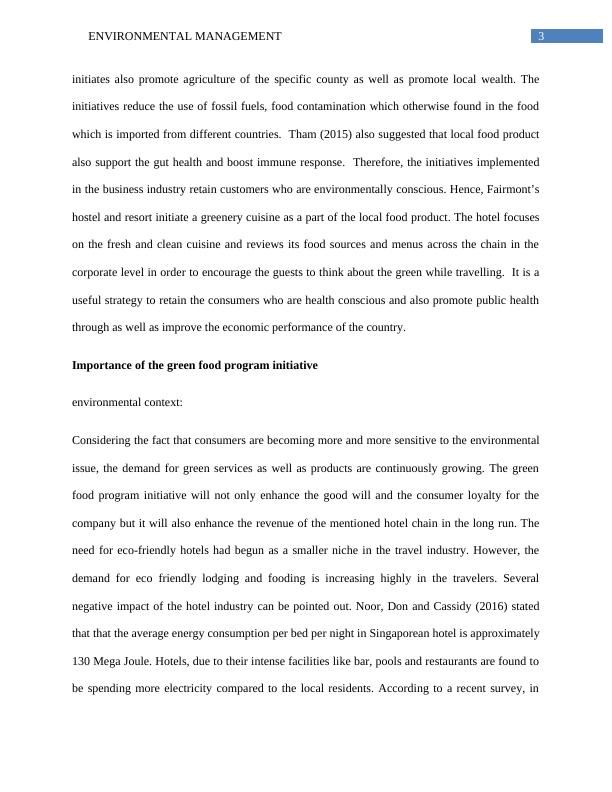Green Food Program Initiative for Sustainable Development in the Hospitality and Tourism Industry
Added on 2023-04-19
11 Pages2746 Words350 Views
Running head: ENVIRONMENTAL MANAGEMENT
Environmental Management for Sustainable Development
Name of the Student
Name of the University
Author Note
Environmental Management for Sustainable Development
Name of the Student
Name of the University
Author Note

1ENVIRONMENTAL MANAGEMENT
Introduction
The Fairmont hotels and resorts refer to a highly popular chain of luxury hotel
headquartered at Toronto. The hotel chain is owned by AccorHotel since the year 2016. Fairmont
operates in more than 24 countries and Singapore is one of the most mention worthy locations.
Considering the fact that the residents of majority of the residents in the developed countries like
Singapore are more inclined towards healthy lifestyle, the mentioned hotel chain has launched a
brand wide commitment in order to offer menus which are focused on sustainable, locally
sourced and organically grown products. In order to understand the impact of this green culinary
revolution, Fairmount is continuously assessing the impact of the initiative taken on the
consumers of Singapore. The management continuously works on identifying the sectors where
difference can be made through responsible food purchasing practices as well as menus across
the chain in order to reflect their focus on clean and fresh cuisine. The chief reason behind this
Green Cuisine Programme includes enhancing the sustainability as well as eradicating the health
issues of the consumers. In this report, the background concept of the hospitality and tourism
industry and the concept of locally produced food initiatives will be identified and analyzed.
Along with this, critical evolution of green food programmes as a form of sustainability
development will also be conducted in this paper. The advantages as well as challenges of the
mentioned initiative will be discussed in this report.
Discussion:
Background:
Hospitality and tourism industry is a broad category of a field within the service industry
that involves lodging, event planning, transportations, and cruise line (Fong, Luke and Law
Introduction
The Fairmont hotels and resorts refer to a highly popular chain of luxury hotel
headquartered at Toronto. The hotel chain is owned by AccorHotel since the year 2016. Fairmont
operates in more than 24 countries and Singapore is one of the most mention worthy locations.
Considering the fact that the residents of majority of the residents in the developed countries like
Singapore are more inclined towards healthy lifestyle, the mentioned hotel chain has launched a
brand wide commitment in order to offer menus which are focused on sustainable, locally
sourced and organically grown products. In order to understand the impact of this green culinary
revolution, Fairmount is continuously assessing the impact of the initiative taken on the
consumers of Singapore. The management continuously works on identifying the sectors where
difference can be made through responsible food purchasing practices as well as menus across
the chain in order to reflect their focus on clean and fresh cuisine. The chief reason behind this
Green Cuisine Programme includes enhancing the sustainability as well as eradicating the health
issues of the consumers. In this report, the background concept of the hospitality and tourism
industry and the concept of locally produced food initiatives will be identified and analyzed.
Along with this, critical evolution of green food programmes as a form of sustainability
development will also be conducted in this paper. The advantages as well as challenges of the
mentioned initiative will be discussed in this report.
Discussion:
Background:
Hospitality and tourism industry is a broad category of a field within the service industry
that involves lodging, event planning, transportations, and cruise line (Fong, Luke and Law

2ENVIRONMENTAL MANAGEMENT
2014). Due to an immense amount of business involved in the hospitality and tourism, it is one
of the large revenue makers for many countries (Kim et al. 2015). In this context, one of the
biggest revenue makers is hotels of Singapore. The Fairmont hotel and resort situated in the
prestigious part of Singapore. In Singapore, the hospitality industry covers a diverse business
chain which includes travelling, hotels, food and beverages, and entertainment. However, due to
the presence of several zoos, museum and Buddhist temple, the hospitality and tourism industry
of Singapore solely focused on the hotels and tourist attraction. Unique hospitality business such
as medical tourism is one of the biggest revenue makers for Singapore since people overseas
come to Singapore for cheap and effective services. According to Fang and Law (2016), the
country had over 400 hotels and the largest supporter of this hospitality and tourism industry is
international visitors in search of medical procedures, business meeting or gambling.
The concept of locally produced food initiatives:
According to the United Nations world tourism organization, 5% percent id the world’s carbon
oxide is produced by international tourism business (Kim, Hlee and Joun 2016). Therefore, for
the environmentally conscious customers recommended a hotel which offers locally produced
food in order to resolve the environmental issue. The concept of the locally produces food
initiatives defined as a supply of the locally produced food in hotels or other hospitality industry
in order to promote the business and retain customers (Ho and Law 2017). Therefore, the locally
produced food initiates were taken by Singapore for incorporating it into the hospital and tourism
industry in order to retain the customers from the different end of the world. There are
advantages of the locally produced food initiatives in the context of increasing economic
performance and promoting healthy life. Buying local foods increase community health since
eating foods free from pesticides reduced the rate of mortality and obesity. Moreover, the
2014). Due to an immense amount of business involved in the hospitality and tourism, it is one
of the large revenue makers for many countries (Kim et al. 2015). In this context, one of the
biggest revenue makers is hotels of Singapore. The Fairmont hotel and resort situated in the
prestigious part of Singapore. In Singapore, the hospitality industry covers a diverse business
chain which includes travelling, hotels, food and beverages, and entertainment. However, due to
the presence of several zoos, museum and Buddhist temple, the hospitality and tourism industry
of Singapore solely focused on the hotels and tourist attraction. Unique hospitality business such
as medical tourism is one of the biggest revenue makers for Singapore since people overseas
come to Singapore for cheap and effective services. According to Fang and Law (2016), the
country had over 400 hotels and the largest supporter of this hospitality and tourism industry is
international visitors in search of medical procedures, business meeting or gambling.
The concept of locally produced food initiatives:
According to the United Nations world tourism organization, 5% percent id the world’s carbon
oxide is produced by international tourism business (Kim, Hlee and Joun 2016). Therefore, for
the environmentally conscious customers recommended a hotel which offers locally produced
food in order to resolve the environmental issue. The concept of the locally produces food
initiatives defined as a supply of the locally produced food in hotels or other hospitality industry
in order to promote the business and retain customers (Ho and Law 2017). Therefore, the locally
produced food initiates were taken by Singapore for incorporating it into the hospital and tourism
industry in order to retain the customers from the different end of the world. There are
advantages of the locally produced food initiatives in the context of increasing economic
performance and promoting healthy life. Buying local foods increase community health since
eating foods free from pesticides reduced the rate of mortality and obesity. Moreover, the

3ENVIRONMENTAL MANAGEMENT
initiates also promote agriculture of the specific county as well as promote local wealth. The
initiatives reduce the use of fossil fuels, food contamination which otherwise found in the food
which is imported from different countries. Tham (2015) also suggested that local food product
also support the gut health and boost immune response. Therefore, the initiatives implemented
in the business industry retain customers who are environmentally conscious. Hence, Fairmont’s
hostel and resort initiate a greenery cuisine as a part of the local food product. The hotel focuses
on the fresh and clean cuisine and reviews its food sources and menus across the chain in the
corporate level in order to encourage the guests to think about the green while travelling. It is a
useful strategy to retain the consumers who are health conscious and also promote public health
through as well as improve the economic performance of the country.
Importance of the green food program initiative
environmental context:
Considering the fact that consumers are becoming more and more sensitive to the environmental
issue, the demand for green services as well as products are continuously growing. The green
food program initiative will not only enhance the good will and the consumer loyalty for the
company but it will also enhance the revenue of the mentioned hotel chain in the long run. The
need for eco-friendly hotels had begun as a smaller niche in the travel industry. However, the
demand for eco friendly lodging and fooding is increasing highly in the travelers. Several
negative impact of the hotel industry can be pointed out. Noor, Don and Cassidy (2016) stated
that that the average energy consumption per bed per night in Singaporean hotel is approximately
130 Mega Joule. Hotels, due to their intense facilities like bar, pools and restaurants are found to
be spending more electricity compared to the local residents. According to a recent survey, in
initiates also promote agriculture of the specific county as well as promote local wealth. The
initiatives reduce the use of fossil fuels, food contamination which otherwise found in the food
which is imported from different countries. Tham (2015) also suggested that local food product
also support the gut health and boost immune response. Therefore, the initiatives implemented
in the business industry retain customers who are environmentally conscious. Hence, Fairmont’s
hostel and resort initiate a greenery cuisine as a part of the local food product. The hotel focuses
on the fresh and clean cuisine and reviews its food sources and menus across the chain in the
corporate level in order to encourage the guests to think about the green while travelling. It is a
useful strategy to retain the consumers who are health conscious and also promote public health
through as well as improve the economic performance of the country.
Importance of the green food program initiative
environmental context:
Considering the fact that consumers are becoming more and more sensitive to the environmental
issue, the demand for green services as well as products are continuously growing. The green
food program initiative will not only enhance the good will and the consumer loyalty for the
company but it will also enhance the revenue of the mentioned hotel chain in the long run. The
need for eco-friendly hotels had begun as a smaller niche in the travel industry. However, the
demand for eco friendly lodging and fooding is increasing highly in the travelers. Several
negative impact of the hotel industry can be pointed out. Noor, Don and Cassidy (2016) stated
that that the average energy consumption per bed per night in Singaporean hotel is approximately
130 Mega Joule. Hotels, due to their intense facilities like bar, pools and restaurants are found to
be spending more electricity compared to the local residents. According to a recent survey, in

End of preview
Want to access all the pages? Upload your documents or become a member.
Related Documents
Essay on Hotels and Hospitality Managementlg...
|12
|3585
|207
Hospitality Business Strategylg...
|16
|4055
|48
Great Barrier Reef Management Case Study 2022lg...
|5
|912
|14
Application For Sustainable Tourism Fundinglg...
|7
|1935
|147
